高一英语必修一第二单元知识盘点
高一必修一英语u2知识点总结

高一必修一英语u2知识点总结Unit 2 Knowledge Points SummaryIn this article, we will provide a comprehensive summary of the key knowledge points covered in Unit 2 of the first year of high school English. Please note that the content will be presented in an organized and visually appealing manner, without any disruptive elements that may affect the reading experience.1. Vocabulary and Phrases1.1 Word FormationWord formation processes include affixation, compounding, conversion, and blending.1.2 CollocationsCollocations are words commonly used together, such as "make a decision" or "take a risk."1.3 Idioms and ExpressionsIdioms and expressions are fixed phrases with non-literal meanings, like "break a leg" or "kick the bucket."1.4 Synonyms and AntonymsSynonyms are words with similar meanings, while antonyms have opposite meanings.1.5 Homophones and HomonymsHomophones are words with the same pronunciation but different meanings, like "their" and "there." Homonyms are words with the same spelling but different meanings, such as "bat" (animal) and "bat" (sports equipment).2. Grammar2.1 Verb TensesThe main verb tenses in English are present simple, present continuous, past simple, past continuous, future simple, and future continuous.2.2 Sentence StructureSentences can be classified into four types: declarative, interrogative, imperative, and exclamatory. Each type has specific features and punctuation rules.2.3 ModalsModals, such as can, could, may, might, must, will, would, should, and ought to, are used to express possibility, necessity, ability, permission, and advice.2.4 Relative ClausesRelative clauses provide additional information about a noun. They begin with relative pronouns, including who, whom, whose, which, and that.2.5 Reported SpeechReported speech is used to convey what someone said. It often involves changes in tenses, pronouns, and adverbs.3. Reading Strategies3.1 Skimming and ScanningSkimming involves quickly reviewing a text to get a general idea. Scanning is searching for specific information within a text.3.2 Guessing Meaning from ContextWhen encountering unfamiliar words, readers can infer their meanings based on the surrounding context and language cues.3.3 Summarizing and ParaphrasingSummarizing is condensing the main ideas of a text into a shorter version. Paraphrasing is expressing the original text's ideas in different words.4. Listening Skills4.1 Note-TakingEffective note-taking techniques involve abbreviations, symbols, and capturing key points.4.2 Predicting and InferringListeners can predict possible answers or infer meaning based on context, tone, and situational cues.4.3 Identifying Main Ideas and Supporting DetailsRecognizing main ideas and supporting details helps listeners comprehend the overall message of a conversation.5. Writing Techniques5.1 Paragraph StructureA well-structured paragraph typically consists of a topic sentence, supporting sentences, and a concluding sentence.5.2 Cohesion and CoherenceCohesion refers to the logical connections between sentences, while coherence ensures the overall clarity and flow of ideas.5.3 Using Linking Words and PhrasesLinking words and phrases, such as however, moreover, and consequently, help establish connections between sentences and paragraphs.5.4 Writing StylesDifferent writing styles, such as descriptive, narrative, expository, and persuasive, serve various purposes and require specific language features.By summarizing the above knowledge points, students will have a better understanding of the key concepts covered in Unit 2 of the first year of high school English. It is crucial to review and practice these elements to enhance language skills and succeed in future English studies.。
高中英语人教版必修一Unit 2 Travelling Around课本知识分类整理
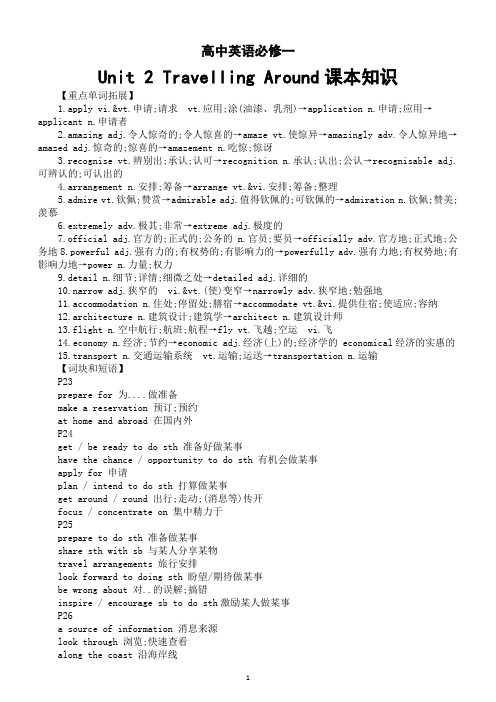
高中英语必修一Unit 2 Travelling Around课本知识【重点单词拓展】1.apply vi.&vt.申请;请求vt.应用;涂(油漆、乳剂)→application n.申请;应用→applicant n.申请者2.amazing adj.令人惊奇的;令人惊喜的→amaze vt.使惊异→amazingly adv.令人惊异地→amazed adj.惊奇的;惊喜的→amazement n.吃惊;惊讶3.recognise vt.辨别出;承认;认可→recognition n.承认;认出;公认→recognisable adj.可辨认的;可认出的4.arrangement n.安排;筹备→arrange vt.&vi.安排;筹备;整理5.admire vt.钦佩;赞赏→admirable adj.值得钦佩的;可钦佩的→admiration n.钦佩;赞美;羡慕6.extremely adv.极其;非常→extreme adj.极度的7.official adj.官方的;正式的;公务的 n.官员;要员→officially adv.官方地;正式地;公务地8.powerful adj.强有力的;有权势的;有影响力的→powerfully adv.强有力地;有权势地;有影响力地→power n.力量;权力9.detail n.细节;详情;细微之处→detailed adj.详细的10.narrow adj.狭窄的vi.&vt.(使)变窄→narrowly adv.狭窄地;勉强地11.accommodation n.住处;停留处;膳宿→accommodate vt.&vi.提供住宿;使适应;容纳12.architecture n.建筑设计;建筑学→architect n.建筑设计师13.flight n.空中航行;航班;航程→fly vt.飞越;空运vi.飞14.economy n.经济;节约→economic adj.经济(上)的;经济学的 economical经济的实惠的15.transport n.交通运输系统vt.运输;运送→transportation n.运输【词块和短语】P23prepare for 为....做准备make a reservation 预订;预约at home and abroad 在国内外P24get / be ready to do sth 准备好做某事have the chance / opportunity to do sth 有机会做某事apply for 申请plan / intend to do sth 打算做某事get around / round 出行;走动;(消息等)传开focus / concentrate on 集中精力于P25prepare to do sth 准备做某事share sth with sb 与某人分享某物travel arrangements 旅行安排look forward to doing sth 盼望/期待做某事be wrong about 对..的误解;搞错inspire / encourage sb to do sth激励某人做某事P26a source of information 消息来源look through 浏览;快速查看along the coast 沿海岸线take control of 控制;接管It is for this reason that…正是这个原因official language 官方语言spend...(in) doing sth 花费...做某事be unique to 对…来说是独一无二的a four-day walking tour为期四天的徒步旅行on the way to 在前往...的路上reach /arrive at one’s destination 到达目的地be amazed by / at 对...感到吃惊cut sth to exact sizes 把某物切割成所精确大小hold together (机器、物品)完好无损other than 除....以外P27connect...to /and / with 把...与..连接起来be made of / from 由.....制成package tour 包价旅游because of / due to 由于;因为make up 构成;形成(be) full of 充满-fill in the table 填写表格recommend sth for/to sb 为某人推荐某物P28the October holiday 十一假期invite sb to sth 邀请某人参加某事base sth on / upon sth 以...为根据;以...为基础have a picnic 野餐P29first / business /economy class 头等舱/商务舱/经济舱method of payment 支付方式check in (在旅馆、机场等)登记check out 结账离开(旅馆等)two single beds room 双床房;标准间double bed room 大床房;双人房king bed room 特大床房a non-smoking area 无烟区P30can't wait to do sth 迫不及待做某事in modern times 在现代be known as 被称作↵P31express emotion 表达情感reply to 答复;回答put up张贴;搭建;举起P32a short times 不久so far 迄今为止be different from 与…不同in order to 为了;以便be sure to do sth 一定要做某事[用于告诉某人记住做某事]keep / stay warm 保暖bring...with sb 把.....带在某人身上pay attention to 注意P33a travel brochure 旅游手册find out 弄清(情况);发现;查明go hiking 远足;徒步旅行over the summer holiday 在暑期attend university 上大学work out 制订(出);解决;计算出as… as possible 尽可能...地P34be / become popular with 为....喜欢;受...欢迎apart / aside from 除了....外(还);此外【教材金句】1.Travel, in the younger sort, is a part of education; in the elder, a part of experience.—Francis Bacon (P23)旅行,于年轻人而言,是教育的一部分;于年长者而言,则是一种经历。
人教必修一Unit2 单元知识梳理
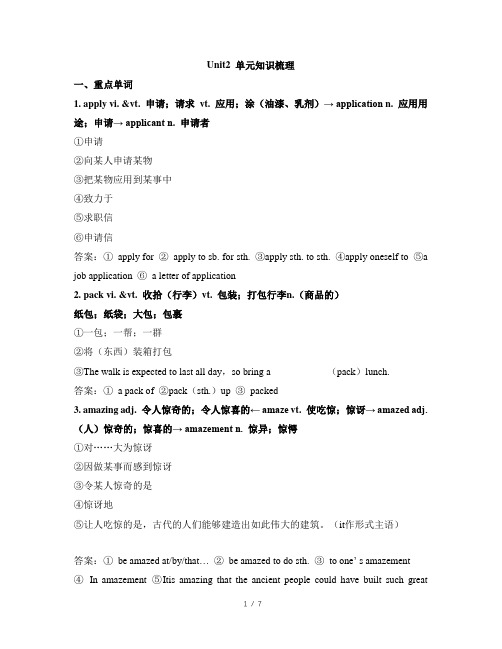
Unit2 单元知识梳理一、重点单词1. apply vi. &vt. 申请;请求vt. 应用;涂(油漆、乳剂)→ application n. 应用用途;申请→ applicant n. 申请者①申请__________________②向某人申请某物___________________③把某物应用到某事中__________________④致力于_________________⑤求职信_________________⑥申请信_________________答案:①apply for ②apply to sb. for sth. ③apply sth. to sth. ④apply oneself to ⑤a job application ⑥a letter of application2. pack vi. &vt. 收拾(行李)vt. 包装;打包行李n.(商品的)纸包;纸袋;大包;包裹①一包;一帮;一群_________________②将(东西)装箱打包_________________③The walk is expected to last all day,so bring a ___________(pack)lunch.答案:① a pack of ②pack(sth.)up ③packed3. amazing adj. 令人惊奇的;令人惊喜的← amaze vt. 使吃惊;惊讶→ amazed adj.(人)惊奇的;惊喜的→ amazement n. 惊异;惊愕①对……大为惊讶______________②因做某事而感到惊讶_________________③令某人惊奇的是________________④惊讶地____________________⑤让人吃惊的是,古代的人们能够建造出如此伟大的建筑。
(it作形式主语)________________________________________________________________答案:①be amazed at/by/that… ②be amazed to do sth. ③to one’ s amazement④In amazement ⑤Itis amazing that the ancient people could have built such greatarchitecture.4. arrange vt. &vi. 安排,筹划→ arrangement n.安排;筹备①安排做某事__________________②为某人安排某事_________________③为……做安排/准备____________________④谈妥,达成协议__________________⑤The books were all neatly in place,carefully ____________(arrange).答案:①arrange to do sth. ②arrange sth. for sb. ③make arrangements for. ④arrive at/come to an arrangement5. recognise vi.辨别出;承认;认可;认识;认知recognition n.识别;承认,认出①通过……认出……________________②把……看作……_________________③认不出来_______________④大家都承认他是比赛中的最佳选手。
必修一英语Unit2知识点详解

Unit2(一)词汇1. commandn. & vt. 命令;指令;掌握The officer commanded his soldiers to fire. 那名军官命令士兵们开火。
A general is a man who commands a large number of soldiers.将军是统率众多士兵的人。
常用结构:①at/ by sb’s command 听某人支配②take command of 控制③in command of 指挥着④under one’s command 由某人的指挥⑤under the command of sb. 在某人的指挥下⑥command sb. to do sth. 命令某人做某事⑦command (=order) that ... 命令……(从句用虚拟语气,即should+ do 形式,should可省略)联想拓展commander n. 指挥官2. requestvt.&n. 请求;恳求;要求常用结构:①request sb. to do sth.请求某人做某事②request sth. from/of sb. 向某人要求某物③request that sb. (should) do sth.要求某人做某事④make a request/requests 发出请求⑤at the request of sb.=at sb.’s request依照某人的请求易混辨析request/demand/requirerequest表示“有礼貌的请求;正式的请求”。
demand表示“有正当权利的要求”,因此含有“坚决或强烈要求”的意思。
require表示“要求所必须的东西;法律、协定、规章以及其他客观情况的要求”。
但它们也有不同之处:Page No.47①require和request都可以接宾语+to do sth.结构,而demand没有此种用法。
人教版高一必修一 第二单元知识点全面总结 归纳
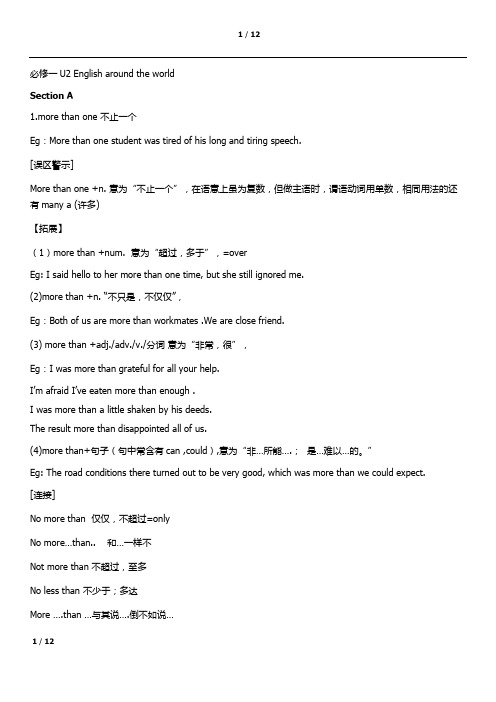
必修一U2 English around the worldSection A1.more than one 不止一个Eg:More than one student was tired of his long and tiring speech.[误区警示]More than one +n. 意为“不止一个”,在语意上虽为复数,但做主语时,谓语动词用单数,相同用法的还有many a (许多)【拓展】(1)more than +num. 意为“超过,多于”,=overEg: I said hello to her more than one time, but she still ignored me.(2)more than +n. “不只是,不仅仅”,Eg:Both of us are more than workmates .We are close friend.(3) more than +adj./adv./v./分词意为“非常,很”,Eg:I was more than grateful for all your help.I’m afraid I’ve eaten more than enough .I was more than a little shaken by his deeds.The result more than disappointed all of us.(4)more than+句子(句中常含有can ,could),意为“非…所能….;是…难以…的。
”Eg: The road conditions there turned out to be very good, which was more than we could expect.[连接]No more than 仅仅,不超过=onlyNo more…than.. 和…一样不Not more than 不超过,至多No less than 不少于;多达More ….than …与其说….倒不如说…Less than 不足,不到;少于Rather than而不是Other than 除了2.voyage n. 航行;尤指航海或航空The sea became calm after the storm, so they decided to make a voyage . The scientist planned to go on a voyage to the Moon.[拓展]Make /take a voyage 去航海,去航行Go on a voyage 正在航海;正在航行表示动作Be on a voyage 正在航海;正在航行表示状态【辨析】voyage ,journey ,trip, tour, travelVoyage n.[C] 指海上旅行或航行Eg:he went on a voyage around the world.【辨析】Journey n. [C] 常指远距离的陆地旅行,也指“旅程,旅途”Eg:Wish you a pleasant journey.Trip n.[C]指短途,短期旅行,远足,也指“因事出行”They made a trip to the seaside last weekend .Tour n.[C,U] 指团队观光旅游,也可表示“巡视,巡回比赛”或“演出”Eg:I prefer a walking tour.The band is on tour in France.Travel n.[C,U] 常指长距离旅行,或国外旅行,是旅行的总称The novel is based on his travel in India.3.even if =even though 即使,虽然Eg:Even if he suffered from a lot of difficulties, he never gave in .【误区警示】①even if/even though 引导让步状语从句,主句用一般将来时,从句用一般现在时表示将来Eg:Even if I fail this ,I will try again.②as if/though 好像,仿佛引导方式状语从句或表语从句Eg:It looks as if it’s going to rain.e up(1) 走近;上前;赶上My teacher came up and talked with me face to face.(2)(被)提出,(被)谈到Eg: In order to finish the task on time, a good piece of advice came up at the meeting.(3)(太阳,月亮)升起;露出地面,发芽;出席,到场Eg:The sun has come up .She came up for the interview but didn’t get the job.The spring is coming and green grass is coming up.[误区警示] come up 做“被提出,被谈到”讲时为不及物动词短语,不能用于被动;come up with 主语为人,“提出”,宾语为表示“建议,计划,方案等”名词Eg:Your name came up in our conversation once or twice.She came up with a new idea at the meeting.【拓展】Come up to 达到(标准等),比得上Come on 赶快,加油Come about 发生Come across 邂逅,偶遇Come to 达到;苏醒,共计Come over走过来,顺便拜访Come out 出现;真相大白;结果是;出版;开花Eg: How did the problem come about?I come across an old friend t the party.5.actually adv.(1)(在口语中用于强调事实),实际上,事实上Eg:I don’t actually remember it.It seemed as if they fell in love with each other, but actually she disliked him. (2)(表示想法与事实不一致而感到惊奇) 居然;竟然He is actually over fifty years old.(3)(礼貌地纠正他人) 实际上,事实上Growing vegetables looks easy, but actually it takes a lot of learning .(4)(用于引起鄙人注意或转移话题)说实在的Actually ,I’m busy at the moment,--can I call you back later?[拓展]In actual fact=as a matter of fact =in reality/fact =actually 事实上;实际上6.base vt. 以…为根据n. 基部;基地;基础base…on/upon 把…建立,在…上be based on /upon 以…为基础;改编自One should always base his opinion on facts.In my dairy ,I set down a series of things that are all based on facts.They settled down at the base of the mountain.Do you know where the air base is? 空军基地These politics have a broad base of the masses.【辨析】Base 表示具体含义,意为“根基,基础,底座” the base of a building . 底座Basis 表示抽象含义,意为“基础”, the economic basis 基础【单词积累】Basic adj. 基本的,基础的;根本的Basically adv. 基本地;主要地7.at present =at the present time= in the present 现在,目前Eg: At present, I am suffering from a bad back.I’m getting along well with my new classmates at present.I’m very busy at present ,and I can’t join in your game .[拓展](1)present 做形容词时位置不同,意义不同;做前置定语,意为“现在的,当前的”;做后置定语时,意为“出席的,到场的”Eg:Did you see the present government leaders? 你见到现任政府领导人了吗Did you see the government leaders present ? 你见到在场的政府领导人了吗(2)做动词,意为“把…交给,颁发”。
高一英语必修一unit2知识点梳理
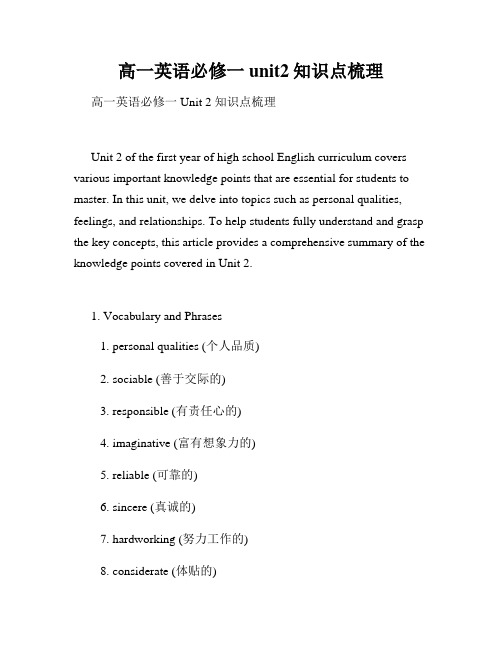
高一英语必修一unit2知识点梳理高一英语必修一Unit 2 知识点梳理Unit 2 of the first year of high school English curriculum covers various important knowledge points that are essential for students to master. In this unit, we delve into topics such as personal qualities, feelings, and relationships. To help students fully understand and grasp the key concepts, this article provides a comprehensive summary of the knowledge points covered in Unit 2.1. Vocabulary and Phrases1. personal qualities (个人品质)2. sociable (善于交际的)3. responsible (有责任心的)4. imaginative (富有想象力的)5. reliable (可靠的)6. sincere (真诚的)7. hardworking (努力工作的)8. considerate (体贴的)9. understanding (善解人意的)10. courageous (勇敢的)2. Grammar Points1. Comparative and superlative forms of adjectives (比较级和最高级形式的形容词)- Examples: "more sociable," "the most imaginative"2. Prepositional phrases of time and place (时间和地点的介词短语)- Examples: "on a sunny day," "at school"3. Verbs followed by gerunds or infinitives (动词+动名词或不定式)- Examples: "enjoy doing," "decide to do"3. Reading Comprehension1. Reading strategies (阅读策略)- Skimming and scanning- Understanding context clues2. Text analysis (文本分析)- Identifying main ideas and supporting details- Making inferences and predictions3. Vocabulary in context (上下文词汇理解)- Using context to determine meaning4. Writing Skills1. Descriptive writing (描写性写作)- Using adjectives and adverbs to create vivid descriptions- Organizing ideas and details logically5. Speaking and Listening1. Giving opinions and expressing agreement/disagreement (表达观点和赞同/不赞同)2. Effective communication strategies (有效的交流策略)- Active listening- Asking for clarification6. Cultural Awareness1. Understanding cultural differences (理解文化差异)- Personal qualities valued in different cultures- Etiquette and social normsBy reviewing and consolidating these knowledge points, students will be better prepared to understand and communicate effectively in English. It is essential to practice and apply these concepts in various contexts, both inside and outside the classroom, to enhance language proficiency.。
高一英语必修一1、2单元知识点总结
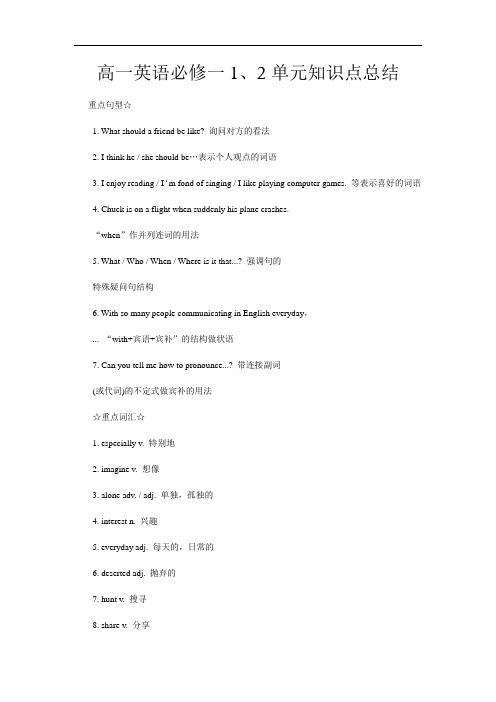
高一英语必修一1、2单元知识点总结重点句型☆1. What should a friend be like? 询问对方的看法2. I think he / she should be…表示个人观点的词语3. I enjoy reading / I‘m fond of singing / I like playing computer games. 等表示喜好的词语4. Chuck is on a flight when suddenly his plane crashes.“when”作并列连词的用法5. What / Who / When / Where is it that...? 强调句的特殊疑问句结构6. With so many people communicating in English everyday,... “with+宾语+宾补”的结构做状语7. Can you tell me how to pronounce...? 带连接副词(或代词)的不定式做宾补的用法☆重点词汇☆1. especially v. 特别地2. imagine v. 想像3. alone adv. / adj. 单独,孤独的4. interest n. 兴趣5. everyday adj. 每天的,日常的6. deserted adj. 抛弃的7. hunt v. 搜寻8. share v. 分享【归纳】英语中常见道歉用语有:(1) I‘m very sorry. I didn‘t mean to (hurt your feelings).(2) I‘m terribly sorry about that.(3) I‘m afraid I‘ve brought you too much trouble.(4) Please excuse me coming late.(5) Please forgive me.(6) Excuse me,please.(7) I beg your pardon.应答表达有:(1) That‘s / It‘s all right.(2) That‘s / It‘s OK.(3) Never mind.(4) It doesn‘t matter.(5) It‘s nothing.(6) Forget it.(7) Don‘t worry about that.(8) Don‘t mention it.3. Talking about language difficulties in communication 谈论语言交际困难-- I‘m sorry. I can‘t catch you. ____-- OK,it‘s B—L—A—C—K.A. Would you please walk slowly?B. I don‘t understand you.C. What‘s the meaning of this word?D. Would you please repeat it more slowly?[答案与解析] D本题主要考查语言交际困难的功能意念。
高一英语必修一第二章知识点总结
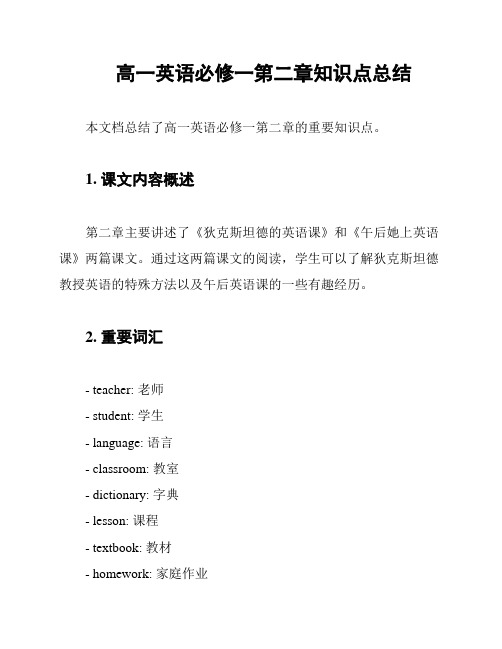
高一英语必修一第二章知识点总结本文档总结了高一英语必修一第二章的重要知识点。
1. 课文内容概述第二章主要讲述了《狄克斯坦德的英语课》和《午后她上英语课》两篇课文。
通过这两篇课文的阅读,学生可以了解狄克斯坦德教授英语的特殊方法以及午后英语课的一些有趣经历。
2. 重要词汇- teacher: 老师- student: 学生- language: 语言- classroom: 教室- dictionary: 字典- lesson: 课程- textbook: 教材- homework: 家庭作业3. 语法要点- 现在进行时:用于表示正在进行的动作或状态,构成为“be动词 + 动词-ing”。
例如:I am reading a book.- 一般现在时:用于表示经常性的动作或事实,构成为动词原形。
例如:She studies English every day.- 定冠词和不定冠词:用于表示特定事物或泛指事物。
例如:a book / the book.4. 阅读技巧- 熟练阅读课文,理解文章大意和细节。
- 注重词汇积累,通过查字典研究不熟悉的词汇。
- 注意抓住文章中的关键句子和重要信息。
5. 写作要点- 练写作简单的英语句子,如描述人物、物品、日常活动等。
- 注意语法和拼写的正确性。
- 多阅读英文文章,积累写作素材和提高写作技巧。
以上是对高一英语必修一第二章知识点的总结。
希望这份文档可以帮助您更好地研究和理解该章节的内容。
(字数:171)Note: The provided content is a general summary and does not include specific details from the chapter.。
高一英语必修1Unit2知识梳理、重点词汇解析人教版(4)整理

高一英语必修1Unit2知识梳理、重点词汇解析人教版(4)整理重点词组(旨在供应综合运用所需材料)e up走近;上来;提出[典例]1). The little came up to the stranger and showed him how to get to the police station.小男孩向生疏人走去,并告知他去警察局的路。
3). It is certain that the question will come up at the meeting. 这个问题在会议上肯定会被提出来的。
5). I am afraid something urgent has come up. 唯恐发生了什么急事。
[短语归纳]come across邂逅come about发生come at向扑来,攻击come from 来自come out 出版;开花;结果是come up with想出come round 绕道而来come down落下,塌下[练习] 用come构成的词组填空。
1). The hunter walked across the forest when suddenly a bear_______ him.2). The magazine __________ once a month.3). I wish you can ___________ to England on your holiday.4). The engineers has ______________ new ways of saving energy.5). They ___________ an old school friend in the street this morning.答案: 1). came at 2). comes out 3). come over 4). come up with 5). came across2. make use of 利用;使用[典例]1). You ought to make good use of any opportunity to practise English. 你应当好好利用机会练习英语。
高一英语必修1unit2知识点
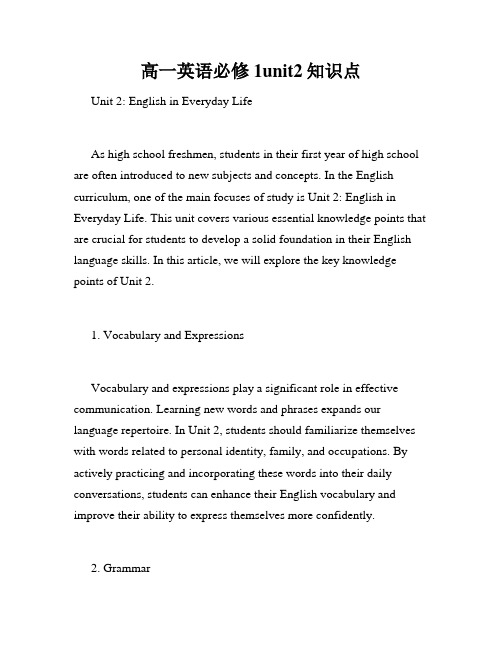
高一英语必修1unit2知识点Unit 2: English in Everyday LifeAs high school freshmen, students in their first year of high school are often introduced to new subjects and concepts. In the English curriculum, one of the main focuses of study is Unit 2: English in Everyday Life. This unit covers various essential knowledge points that are crucial for students to develop a solid foundation in their English language skills. In this article, we will explore the key knowledge points of Unit 2.1. Vocabulary and ExpressionsVocabulary and expressions play a significant role in effective communication. Learning new words and phrases expands our language repertoire. In Unit 2, students should familiarize themselves with words related to personal identity, family, and occupations. By actively practicing and incorporating these words into their daily conversations, students can enhance their English vocabulary and improve their ability to express themselves more confidently.2. GrammarGrammar forms the structural foundation of any language. In Unit 2, students will focus on various grammatical aspects, including verb tenses, sentence structures, and the correct usage of prepositions. It is important for students to grasp these grammar rules to construct grammatically correct and coherent sentences. Regular practice of grammar exercises and engaging in conversational activities will enhance students' understanding and application of English grammar.3. Reading ComprehensionUnit 2 includes a range of reading materials, such as articles, passages, and short stories. Reading comprehension exercises help students develop their reading skills, improve their understanding of the content, and enhance their overall language proficiency. Students should practice reading actively, highlighting key information, and understanding the main ideas and supporting details presented in the texts. Regular reading exercises will contribute to the development of critical thinking and analysis skills.4. Listening and SpeakingListening and speaking skills are essential for effective communication. In Unit 2, students will have opportunities to listen to audio clips, dialogues, and participate in discussions. By actively listening to different accents, intonations, and speech patterns, students can improve their listening comprehension. Engaging in class discussions and group activities will also enhance their speaking abilities, allowing them to express their thoughts and opinions fluently.5. Writing SkillsUnit 2 introduces various writing formats, such as personal narratives, descriptions, and emails. Students will learn to organize their thoughts and ideas coherently, structure their writing, and utilize appropriate vocabulary and grammar. Through constant practice and feedback, students will develop their writing skills, enabling them to effectively communicate through written English.Overall, Unit 2: English in Everyday Life is a vital part of the high school English curriculum. By mastering the knowledge points covered in this unit, students will build a solid foundation in English language skills. Regular practice, active participation in class activities, and dedicating effort to self-study are essential for the successful acquisition of these skills. Through continuous improvement andapplication, students will be well prepared for future English language challenges and effective communication in their everyday lives.。
高一英语必修一unit2知识点

高一英语必修一unit2知识点高一英语必修一unit2知识1重点词汇、短语1. because of 因为、由于2. e up 走近、上来、提出3. actually 实际上、事实上4. base 以…为基础,根基5. at present 目前6. make use of 利用7. such as 例如8. mand 命令、指令、掌握9. request 请求、要求10. play a part/role in 扮演一个角色11. recognize 辨认出、承认、公认12. straight 直接、挺直、笔直的13. be different from 与…不同be the same as 和…一样14. one another 相互,彼此(=each other)15. at the end of 在…结束时16. because of 因为(后接名词或名词性短语)because 因为(后接句子)17. be based on 根据,依据18. at present 目前;当今19. especially 特别,尤其specially 专门地20. make use of 利用…make the best of 充分利用…21. a large number of 大量的,很多(作主语时,谓语动词用复数)the number of …的数量(作主语时,谓语动词用单数)22. in fact = actually= as a matter of fact 事实上23. make lists of… 列清单24. included 包括(前面接包括的对象)including包括(后面接包括的对象)25. mand sb. to do sth. 命令某人去做某事mand + that 从句(从句用should+V原)26. request sb. to do sth. 要求某人做某事request + that 从句(从句用should+V原)高一英语必修一unit2知识2重点句型1. World Englishes e from those countries where English plays an important role as a first or second language, either because of foreign rule or because of its special role as an international language.(定语从句)世界英语来自那些以英语为第一或第二语言的国家,英语在这些国家起重要作用,或是因为外国的统治,或是因为其作为国际语言的特殊地位。
高一英语必修一unit2知识点总结
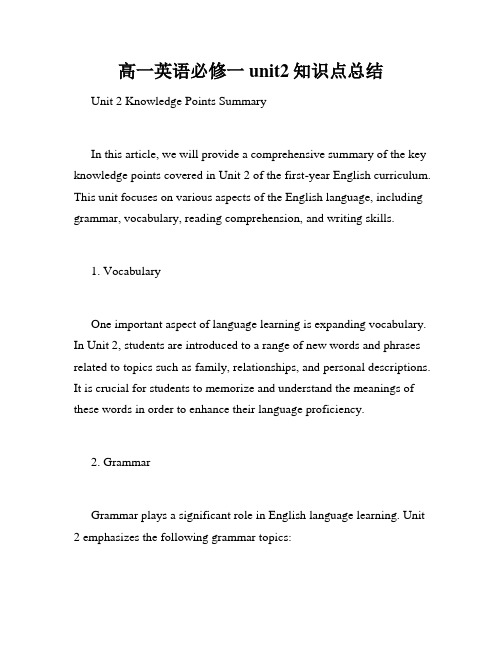
高一英语必修一unit2知识点总结Unit 2 Knowledge Points SummaryIn this article, we will provide a comprehensive summary of the key knowledge points covered in Unit 2 of the first-year English curriculum. This unit focuses on various aspects of the English language, including grammar, vocabulary, reading comprehension, and writing skills.1. VocabularyOne important aspect of language learning is expanding vocabulary. In Unit 2, students are introduced to a range of new words and phrases related to topics such as family, relationships, and personal descriptions. It is crucial for students to memorize and understand the meanings of these words in order to enhance their language proficiency.2. GrammarGrammar plays a significant role in English language learning. Unit 2 emphasizes the following grammar topics:2.1 Simple Present Tense: Students learn how to form sentences using the simple present tense to express general truths, habits, and routines. They also practice using the third person singular form correctly.2.2 Possessive Adjectives: Students are introduced to possessive adjectives (my, your, his, her, its, our, their) and learn how to use them to indicate ownership or relationship.2.3 Subject and Object Pronouns: The unit covers subject pronouns (I, you, he, she, it, we, they) and object pronouns (me, you, him, her, it, us, them). Students learn how to differentiate between the two and correctly use them in sentences.3. Reading ComprehensionImproving reading comprehension skills is vital for overall language proficiency. In Unit 2, students are exposed to various reading passages that focus on family dynamics, personal growth, and societal issues. They learn techniques such as skimming, scanning, and inference to understand the main ideas, details, and author's intentions.4. Writing SkillsUnit 2 focuses on developing students' writing skills through personal descriptions and informal letters. They learn how to effectively describe themselves, their families, and friends using appropriate vocabulary and grammatical structures. In addition, students practice writing informal letters, paying attention to the format, content organization, and appropriate language use.In conclusion, Unit 2 of the first-year English curriculum provides students with essential knowledge and skills to enhance their language proficiency. By expanding vocabulary, understanding grammar rules, improving reading comprehension, and honing writing skills, students can develop a solid foundation in English language learning.。
高一英语必修1Unit2知识梳理、重点词汇解析人教版

人教版高一英语必修一Unit2知识梳理、重点词汇解析及单元自测Unit2一、知识点1. go to the pictures去看电影(美);go to the movies 去看电影(英)2. …list the countries that use English as an official language 列举把英语用作官方语言的国家3. the road to …通向……之路4. at the end of在……末端,在……尽头,by the end最后(=finally)5. because of 因为…… (注意和because 的区别)Many beautiful fish are fast disappearing because of the severe pollution.因为污染严重,许多美丽的鱼类正在面临绝种。
An argument was inevitable because they disliked each other so much.争论是不可避免的,因为他们彼此非常厌恶。
6. native English speakers 以英语作为母语的人7. even if (= even thoug)即使,用来引导一个让步状语从句,后面既可用陈述语气,也可用虚拟语气,但是even if/even though,引导的从句中不用将来时。
如:Even though/if it rains tomorrow, we will leave for Beijing.8. come up 走上前来,走近,发生,出现 come up with 追上,赶上,提出9. Actually all languages change and develop when cultures meet and communicate with each other.事实上,当不同文化相互交流渗透时,所有的语言都会有所发展、有所变化。
人教版高一英语必修一Unit2知识点讲解

人教版高一英语必修一Unit2知识点讲解一、短语归纳1.多种英语在某些重要方面可能会有所不同4.与现代英语不同bedifferentfrommodern/presentdayenglish5.世界英语worldenglishes5.发挥重要作用7.起着越来越重要的作用playamoreandmore/anincreasinglyimportantpart/role8.因为它特殊的作用becauseofitsspecialrole9.国际语言aninternationallanguage10.16世纪末11.在17世纪初atthebeginningofthe17thcentury12.在20世纪前期intheearly20thcentury13.比以往任何时候都thaneverbefore1}_即使evenif/eventhough15.以德语为基础16.使用更人的词汇星makeuseofawidervocabulary17.它自己的特色itsownidentity1s。
大量说英语的人学习英语的人数迅速增长标准英语信不信由你23.讲最好的英语speakexcellentenglish24.相邻的城镇neighboringtowns25.从一个地方搬到另一个地方充分利用不同的方言27.现状33.提出客气的请求makeapoliterequestA部分重要词语分析1.voyage/journey/travel/trip/tour【解释】航行:出国出海或远行colurnhussucceededinmakingavoyagetoamericain1942.,journey:指较远的从一地到另一地旅行,距离较远,多指陆地theywillmakeajourneytobeijingbytrain.旅行:一系列的旅行,通常指的是旅游。
我们有六天的车程:(短途)旅行thegreenswilltakeaweekendtriptothegreatwall.下个星期我们将去海南旅游【练习】用.上而所提供的辨析词的适当形式填空1]. 从巴黎到莫斯科乘火车旅行。
- 1、下载文档前请自行甄别文档内容的完整性,平台不提供额外的编辑、内容补充、找答案等附加服务。
- 2、"仅部分预览"的文档,不可在线预览部分如存在完整性等问题,可反馈申请退款(可完整预览的文档不适用该条件!)。
- 3、如文档侵犯您的权益,请联系客服反馈,我们会尽快为您处理(人工客服工作时间:9:00-18:30)。
必修1第2单元知识大盘点I. 单词拼写(注意使用单词的正确形式)1.The country’s _____________________ (官方)language is Spanish.2.The Titanic sank on its maiden ________________________ (航行).3.You can always tell the differences between the tourists and _________(当地人).4.I didn’t want to say anything without ___________ (实际)reading the letter first.5.Your children will ___________(逐渐)understand what you have done for them.6.The only way to improve your English is to enlarge your __________ (词汇量).7.He presented two solutions. The ________________ (后者)seems much better.8.He is _______________________ (流利)in Polish.9.You are _____________________ (要求)not to smoke in the office.10.The ____________________ (神色)in her eyes told me something was wrong.11.I ______________________ (认出)him as soon as he came in the room.12.She spoke English with a strong __________________ (地方口音).e _________________ (直接)home after school.14.His ___________ (口音) showed that he was an American.15.he heating system in this ___________ (街区) doesn’t work well.16.It is necessary for you to remember some useful words and ____________ (表达).17.He has lost his ____________ (身份)card and is being questioned by the police.18.A ____________ (地铁)in the US is an underground railway in a city.19.The King _________________(命令)all the people to gather outside the park lastnight.20.A dictionary helps one to distinguish correct and incorrect _______________(用法).II. 根据提示补全句子。
1. It is well known that knowledge _________ _______ ________ ________ (扮演着重要的角色)in our life.2. ________ _________ _________ _________, (信不信由你) the sports meeting next week is cancelled.3. We should ___________ _____________ _____________ ____________ (充分利用)our spare time to learn English.4. Legends __________ generally _____________ ____________ (以……为基础)real events and people.5. Sally looks much prettier __________ ___________ ___________. (比以前)6. Please____________ ____________ ____________(列一份清单) beforeshopping.7.We are used to _________ _________(交流/沟通) each other by e-mail nowadays.8. When the thief saw a policeman _________ _________ ________ (走向) him, he ran away quickly.9.Some practical suggestions __________ _________ (被提出) at the meeting.10.What he said ________ quite ____________ _________ (与……不同)what he did.11. _______________ _______________ (因为) being ill he had to come back beforefinishing his work.12. They will stand by you _________ ________ (即使) you don’t succeed.13. ______ ________ ________ (在19世纪60年代) the American Civil War broke out.14. Can you tell me how the accident _________ _________ (发生)?15. We learn eight subjects, ________ ______ (例如) Chinese, English, physics andso on16. ___________ ___________ (目前), he is on holiday.17. ________ ________ _________ ________ (在……末尾) the road you’ll find a shop.18. We will have finished the work _______ ________ ________ _______ (到……为止) next month.19. Don’t make __________ ____________ mistake _____________(同样的)you did last time.20. Why has English changed ___________ _____________ (随着时间的推移)。
III. 重点句型及短语。
1.over 用法积累。
出处:Why has English changed over time?(必修一第10页)翻译:为什么随着时间的推移英语发生变化呢?解析:(1)over在此处为“在。
期间”,在意思上基本等同于during,当然over time 可以意译为随着时间的推移。
We’ll discuss it over lunch. 吃午饭时我们讨论它。
(2)over或in加过去的时间段在句子中做时间状语时,谓语动词一般采用现在完成时。
高考链接:Over the past decades, sea ice _____ in the Arctic as a result of global warming. (2009年浙江卷)A. had decreasedB. decreasedC. has been increasingD. is decreasingLife was difficult for the family then but things ________________ better and better over the years. (《英语周报》第四期同步评估第20题)A. gotB. were gettingC. have gotD. would get.With the help of high technology, more and more new substances ______ in the past years. (2007年上海卷)A. discoveredB. have discoveredC. had been discoveredD. have been discoveredThe unemployment rate in this district ______ from 6% to 5% in the past two years. (2007年上海春季)A. has fallenB. had fallenC. is fallingD. was falling2. more A than B出处:It was based more on German than the English we speak at present. (必修一第10页)翻译:它(早期的英国英语)是以德语为基础而不是以我们现在说的英语为基础。
解析:(1)be based on sth. 以。
为基础。
The movie is based on a real-life story. 这部电影是以一件真实的故事为依据的。
(2)more A than B, 是A不是B。
In some ways, American English is more like the English of Shakespeare than modern British English. 在某种程度上,美国英语更像莎士比亚时代的英语而不像现代英国英语。
3. the number of 与a number of出处:Today the number of people learning English in China is increasing rapidly.翻译:今天中国学英语的人的数量急剧增加。
解析:the number of sth:。
